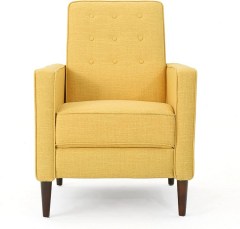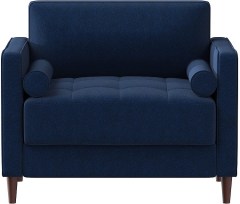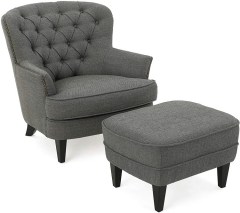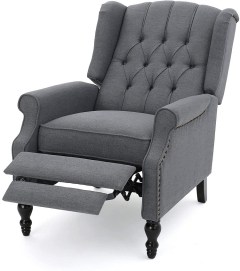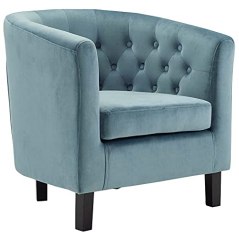Buying guide for best armchairs
Looking for the right piece of furniture where you can cozy up and unwind? Take a seat in a comfy armchair and it will quickly become your favorite seat in the house.
An armchair adds a warm, comfortable ambiance to a room. Equipped with a higher seat back, upholstered arms, and an oversize seat, you’ll love how it cradles your body. Armchairs also have superior cushioning compared to other seating options, and consumers often choose them for their exceptional support. Of course, armchairs are also stylish and versatile as either complementary pieces or as stand-alone comfort zones.
How to match an armchair to your space
Armchairs are as versatile as you can get, so they emerge as essential finishing touches in rooms — whether that’s a living room, library, or even bedroom. In fact, it’s the reason you’ll often notice colorful armchairs in real estate listings. They’re attention-grabbing and even more aesthetically pleasing in person.
The same is true in your home: if you choose armchair colors and patterns wisely, you can pull the whole room together. You’ll need to take a good look at your space to consider which style is most complementary, so keep reading to see whether you should play it safe with neutrals or go bold with designs.
Playing it safe with neutrals
If you already have patterned furniture, curtains, or area rugs, a neutral armchair might be the way to go. You can choose any matching solid color or stick to basic gray, white, black, or brown. Many neutral-colored armchairs have monochromatic textured or patterned designs, which give the chair depth and personality while still blending in.
Going bold with designs
If you’re looking for a statement-making piece in a room with fairly neutral furniture, choose an armchair with a more eclectic look. Explore wild florals, bold stripes, polka dots, or fleur-de-lis patterns to add a little pizzazz to a plain space. Of course, if you have interior design expertise, you might even have the eye to mix designs in a way that totally works.
Key considerations
Footprint
Armchairs are made to be used by only one person at a time, so they have a modest footprint. They’re smaller than loveseats, though they’re rather bulky compared to office or dining room chairs. There are also armchairs dubbed “one-and-a-half” chairs, which are on the wider side.
For the most part, you’ll find armchairs are anywhere from 16 inches to 2 feet wide. As with any other new piece of furniture, you’ll need to measure the space, as well as the armchair, to ensure it will fit in your desired location. You may also need to measure doorways and corridors because narrower ones will require some skillful maneuvering to get your armchair in the room.
Popular styles
“Armchair” is a bit of a blanket term that encompasses several similar styles, each with distinctive features:
Wingbacks: These armchairs, with a stately appearance that combines a tall back and curvaceous “wings,” were originally introduced in 17th century England to protect the person sitting in it from cold drafts and the heat of the fireplace.
Club chairs: These armchairs are thickly upholstered and are recognizable by the low- or mid-rise seat back and low arms. They originated as comfortable chairs in men’s clubs in the 1920s.
French-style chairs: These armchairs, modeled on 18th-century French furniture, resemble elaborate dining room chairs with wooden, upholstered arms and cabriole legs.
Contemporary chairs: These can take on a variety of designs, materials, or shapes, though they still have the signature seat back and arms recognizable in armchairs.
Components
Arms: In most armchair designs, the arms are padded and upholstered for maximum comfort. Their height and thickness, however, can differ considerably. Some consumers prefer the coziness of bulky, oversize arms, whereas others prefer the sleek look of shorter, narrower arms.
Cushion: Before you fall in love with the aesthetics of an armchair, make sure you get a good look at — and preferably feel of — the seat cushion. It may or may not be removable. Well-made cushions are around 4 to 6 inches thick and relatively firm. Keep in mind that a firmer cushion doesn’t mean it’s uncomfortable. Rather, it has more structural integrity because it’s densely packed with foam or similar stuffing materials, which means the cushion will remain soft yet supportive without collapsing.
Back: The seat back on an armchair can be low, mid-rise, or tall. This is where you’ll find the most variation between armchairs, not to mention unique design contouring.
Lower seat backs come up to about your mid-back, while mid-rise backs reach closer to the shoulders. Wingbacks are the tallest armchairs, and these can extend up to a foot over your head. Of course, seat back height is relative to the person sitting in the chair, so be sure to take that into consideration as well.
Feet: For the most part, armchair feet range in height from about 3 to 6 inches. Most have wooden or metal feet, and while it may seem like a small detail, the finish on the wood or metal can help coordinate the design of the armchair with the other furniture or accent pieces in a room.
Features
Materials
Armchairs are upholstered in countless materials, and, if anything, you’ll feel spoiled for choice. As expected, premium materials drive up the price of an armchair, though it also means you’re making an investment in quality and longevity.
Leather is a popular choice since it’s long-lasting. However, it usually has the biggest price tag. Vinyl is an affordable alternative, but it can deteriorate within a couple of years. Canvas, microfiber, and linen are often affordably priced, though keeping them clean and stain-free can be a challenge. Of course, there’s always velvet, which exudes elegance and style, though it can be a more expensive option.
Embellishments
While mostly modest in design, some armchairs have embellishments to elevate their style. Perhaps the most recognizable are the brass tacks that line chair edges in brass, gold, or silver tones. Their function is to secure the upholstery to the frame, but now they’re more decorative than anything.
Armchair prices
When it comes to furniture, the more you spend on quality, the longer the piece will last.
Inexpensive: You’ll find budget-friendly armchairs priced around $80 to $300. This range mostly includes kids’ armchairs, as well as adult chairs covered in linen, cotton, microfiber, or vinyl.
Mid-range: If you spend between $300 and $700, you’ll find well-constructed armchairs upholstered in quality materials. You’ll find some leather chairs in this bracket as well.
Expensive: Armchairs priced between $700 and $3,000 are made by premium furniture companies and often have well-made, handcrafted details. This is also where you’ll find most leather armchairs.
Tips
Drink and eat with care in an armchair. Keep stains at bay by limiting eating and drinking in your armchair. If it’s upholstered in linen, it’s also a good idea to spray it with a water-repellent coating.
Clean regularly underneath the chair. To prevent dust and dirt from accumulating beneath your armchair, move it for regular vacuuming and cleaning.
Go bold. A loud pattern is fun and lively and adds personality to the armchair as well as the room. If necessary, you can tone it down with solid-colored throw pillows.
FAQ
Q. I’m not sure I’ll love the armchair I’m getting when styles change in a few years. What should I do?
A. Many people like the design and shape of their armchairs even as the upholstery design falls out of style. Depending on how much you invested in your armchair, it may be worthwhile to get it professionally reupholstered as opposed to getting a new one.
Q. Leather armchairs are expensive. Should I get a vinyl one instead?
A. You could, though the quality won’t hold a candle to that of a leather armchair. After a while, an inexpensive vinyl armchair may begin to peel or crack. While leather costs a lot more money up front, it’s the way to go if you want a piece of furniture that will last for years.
Q. Will my robot vacuum fit under my armchair?
A. Robotic vacuums are designed to navigate tight spaces, like under an armchair, and are programmed to tell whether they will fit beneath low furniture. If the bottom of your armchair has a clearance of 4 1/2 inches or more from the floor, the robot vacuum should be able to fit under it.


